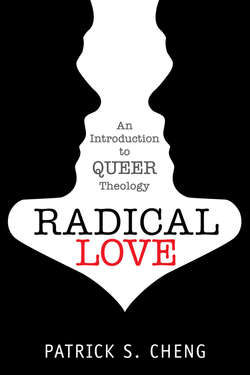Читать книгу Radical Love - Patrick S. Cheng - Страница 15
На сайте Литреса книга снята с продажи.
Defining Queer Theology
ОглавлениеSo what exactly is queer theology? If theology is “talk about God,” then, in light of the above three definitions of “queer,” there are at least three possible definitions for “queer theology.” First, queer theology is LGBT people “talking about God.” Second, queer theology is “talking about God” in a selfconsciously transgressive manner, especially in terms of challenging societal norms about sexuality and gender. Third, queer theology is “talk about God” that challenges and deconstructs the natural binary categories of sexual and gender identity. Let us examine each of these three definitions in turn.
First, in light of the umbrella or collective term definition of “queer,” queer theology can be understood as LGBT people “talking about God.” In other words, queer theology is a shorthand term for theology that is done by and for LGBT people. Thus, instead of writing the phrase “talk about God by and for lesbian, gay, bisexual, transgender, intersex, questioning people as well as our allies” over and over again, we can simply use the term “queer theology” as shorthand. As we have seen, Nancy Wilson has articulated what she calls a “queer theology of sexuality” that is grounded in bodily hospitality. For Wilson, this queer theology speaks to gay men, lesbians, bisexual people, and others who identify as “queer.”14
Second, in light of the definition of “queer” as transgression, queer theology can be understood as a theological method that is self-consciously transgressive, especially by challenging societal norms about sexuality and gender. Thus, queer theology refers to a way of doing theology that, in the words of the Magnificat, brings down the powerful and lifts up the lowly.15 In particular, this theology seeks to unearth silenced voices or hidden perspectives. One example of this kind of theology is the “indecent theology” of the late bisexual theologian Marcella Althaus-Reid from the University of Edinburgh. According to Althaus-Reid, queer theology should shock people out of their complacency and help them see theology in a new light. Althaus-Reid certainly did that in her books Indecent Theology and The Queer God, which contained provocative chapters such as “Oral Sex: sexual his/torias in oral theology”16 and “Kneeling: deviant theologians.”17 Hence, queer theology differs from prophetic discourse in that queer theology is self-consciously transgressive in terms of methodology, whereas prophetic discourse involves speaking on behalf of the divine and subordinating one’s will to that of God (which, of course, may also be a transgressive act).
Third, in light of the definition of “queer” as erasing boundaries, queer theology can be understood as a way of doing theology that is rooted in queer theory and that critiques the binary categories of sexuality (that is, homosexual vs. heterosexual) and gender identity (that is, female vs. male) as socially constructed. In other words, queer theology argues that the discourse of classical Christian theology ultimately requires the erasing of the boundaries of essentialist categories of not only sexuality and gender identity, but also more fundamental boundaries such as life vs. death, and divine vs. human. The recent work of the openly lesbian theologian Elizabeth Stuart of the University of Winchester on the eschatological dimension of the sacraments (such as baptism and the Eucharist) is strongly rooted in this view of queer theology.18
While this book will draw upon all three definitions of queer theology, the main focus will be on the third definition: that is, how queer theology, like queer studies and queer theory, erases boundaries by challenging and deconstructing the “natural” binary categories of sexual and gender identity. Indeed, it is the thesis of this book that Christian theology itself is a fundamentally queer enterprise because it also challenges and deconstructs—through radical love—all kinds of binary categories that on the surface seem fixed and unchangeable (such as life vs. death, or divine vs. human), but that ultimately are fluid and malleable.
In other words, Christian theology is fundamentally a queer enterprise because it focuses upon the incarnation, life, death, resurrection, ascension, and second coming of Jesus Christ, all of which are events that turn upside down our traditional understanding of life and death, divine and human, center and margins, beginnings and endings, infinite and finite, and punishment and forgiveness. As with the case of queer theory, it is in Jesus Christ that all of these seemingly fixed binary categories are ultimately challenged and collapsed.
